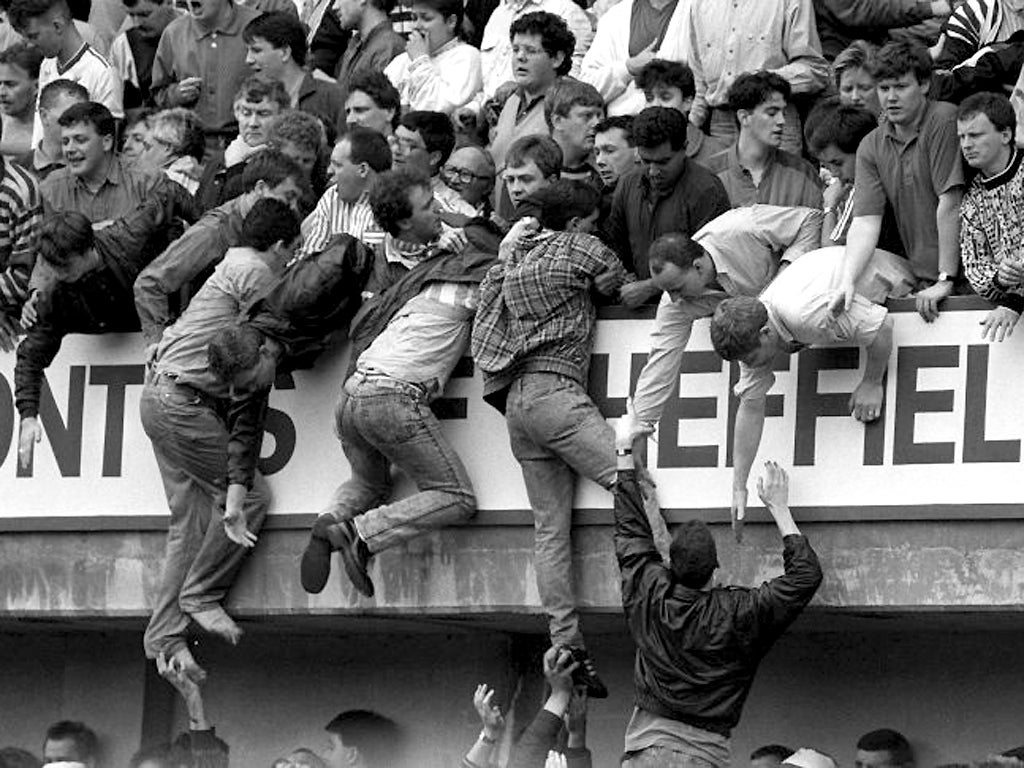After a 23-year wait the real, horrible story emerges at last
Sent to cover the Hillsborough aftermath in his first assignment as a reporter, Ian Herbert traces the long hard search for the truth

Your support helps us to tell the story
From reproductive rights to climate change to Big Tech, The Independent is on the ground when the story is developing. Whether it's investigating the financials of Elon Musk's pro-Trump PAC or producing our latest documentary, 'The A Word', which shines a light on the American women fighting for reproductive rights, we know how important it is to parse out the facts from the messaging.
At such a critical moment in US history, we need reporters on the ground. Your donation allows us to keep sending journalists to speak to both sides of the story.
The Independent is trusted by Americans across the entire political spectrum. And unlike many other quality news outlets, we choose not to lock Americans out of our reporting and analysis with paywalls. We believe quality journalism should be available to everyone, paid for by those who can afford it.
Your support makes all the difference.It was a bleak, autumnal Liverpool day in 1989 when this correspondent's working life began in the aftermath of the disaster that still had a hold on the place. A prime preoccupation of those early weeks – reporting the case of Tony Bland, a 28-year-old who went to Hillsborough and never saw those he loved again – was not joyful. Bland suffered brain damage that left him in a persistent vegetative state and it took his family four years simply to be allowed to withdraw life-prolonging treatment and allow him to die with dignity.
That short, bleak journey with Bland feels like a short lifetime ago now and makes it seem even more staggering that such an extraordinary volume of previously unknown detail on the fateful FA Cup semi-final should have taken until yesterday to be delivered back to Liverpool.
Nine dignified individuals, led by a bishop, engaged in two-and-a-half years of quiet, persistent pursuit of information. The quality and quantity of what they produced took your breath away – and blew away for ever the "3.15 cut-off", effectively clearing the way for the inquests that will surely prove that the deaths of 96 people were caused by misadventure, if not manslaughter.
The single most vital finding from yesterday's report was that 28 people did not die as the inquest coroner, Stefan Popper, said they had done, and that another 31 had heart and lung functions after the Leppings Lane crush – meaning Popper's inquests were deeply flawed. And yet, the devil for us all was in the small detail. I do still recall the air of collective indignation and determination within the Liverpool Daily Post offices that autumn of '89, as a crusading zeal took hold to do the victims justice. But yesterday it emerged that even "we" had been initially swept along by the tide of lies about Liverpool fans propagated by people such as the Sheffield Tory MP Irvine Patnick, South Yorkshire Police Chief Constable Peter Wright, and local Police Federation secretary PC Paul Middup – and then disseminated by Sheffield's Whites news agency.
It took presence of mind not to swallow the disinformation that was further cooked up in the Pickwick Restaurant in Sheffield, where a 10am Special Joint Branch Board Meeting of the local police federation was held. That meeting was joined by Wright, the Chief Constable, who wanted to talk about the "trauma" inflicted on the force.
It has been Liverpool's greatest misfortune that no one arrived to correct this narrative. None of the acts chronicled by the Panel yesterday was more unsavoury than the decision of the now discredited coroner, Popper, to take blood samples from the Hillsborough dead to establish the blood alcohol levels. Paragraph 70 of the executive summary also speaks for itself. "A document disclosed to the Panel has revealed that an attempt was made to impugn the reputations of the deceased by carrying out Police National Computer Checks on those with a non-zero alcohol level."
And somehow, as the years passed, Liverpool's plaintive cries for those 96 lost souls became characterised as those of an obsessive, maudlin city. Boris Johnson said that Liverpool wallowed in a "victim status". The editor of The Sun at the time, Kelvin MacKenzie, popped up in December 2006 to say his paper told the truth. "I was not sorry then and I'm not sorry now," he scoffed. I called him to ask him more. He put the phone down.
The story still isn't finished. Yesterday afternoon Trevor Hicks, whose description of losing two daughters was as unbearable to hear this week as it always is, said that prosecutions will be sought now and inquests pursued. A foul rain was falling outside at the time, reminding us that this was not a happy moment and that the truth had arrived 23 years too late.
Join our commenting forum
Join thought-provoking conversations, follow other Independent readers and see their replies
Comments